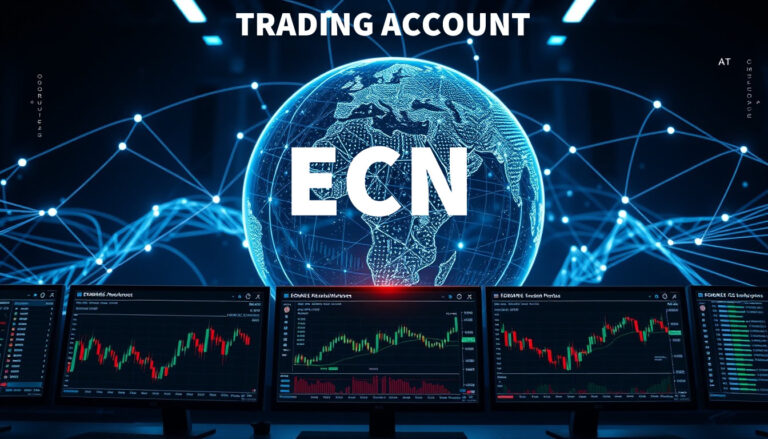Discover the Various Trading Account Types Available
Choosing the right financial platform is crucial for investors. With over 4.8 million active users in Vietnam, the demand for tailored solutions keeps growing. Different strategies require specific features, whether for short-term moves or long-term holdings.
Global leaders like Schwab manage $7.4 trillion in assets, showing the importance of reliable brokerage services. Local platforms such as Bajaj Finserv also gain traction, serving 50 million users across Asia. Regulatory compliance, like OANDA’s NFA membership, ensures safety for investors.
This guide explores key differences in leverage, fees, and asset access. Vietnamese traders will find actionable insights to match their goals with suitable options.
Introduction to Trading Accounts
Financial markets demand secure and efficient transaction platforms. A brokerage account acts as a gateway, enabling investors to buy and sell assets like stocks, commodities, and forex. In Vietnam, these platforms must comply with local regulations, similar to India’s SEBI framework.
Unlike traditional savings accounts, a Schwab cash management account offers liquidity with investment features. Users enjoy seamless transfers and higher interest rates, blending banking with investing.
To open one, investors need:
- Proof of identity (PAN card or Vietnamese equivalent)
- Address verification
- Linked Demat account for securities storage
Key functions include real-time order execution, portfolio tracking, and automated tax documentation. Firms like OANDA set industry standards with 24/7 professional support.
Over 74% of Vietnamese traders use mobile apps for convenience. Platforms like Bajaj Finserv cater to this trend, offering 1M+ Easy EMI products alongside standard investment tools.
Exploring the Different Trading Account Types
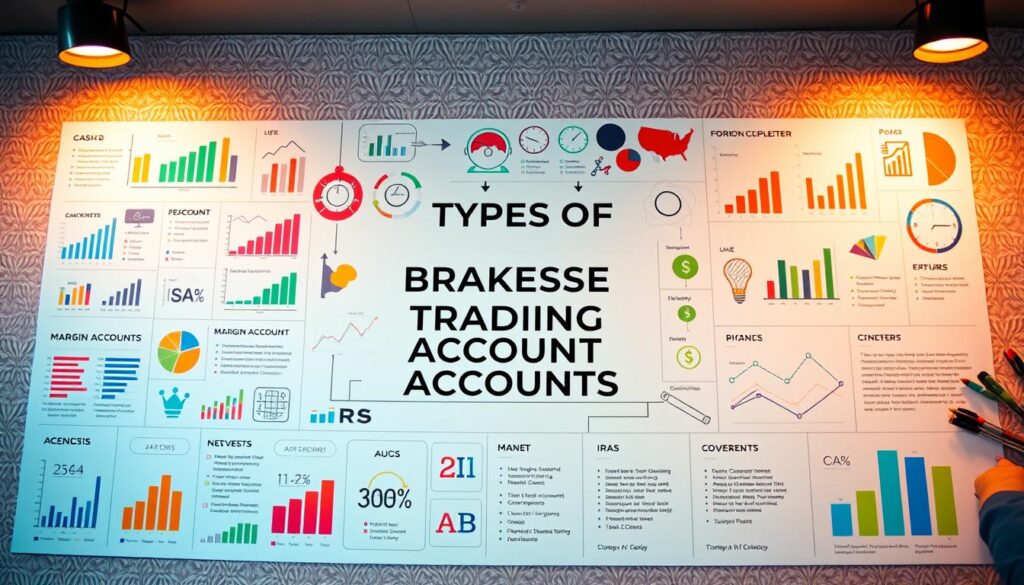
Understanding brokerage options helps optimize investment decisions. Each platform offers unique features for assets like stocks, commodities, or derivatives. Below are four common variants investors consider.
1. Standard Brokerage Accounts
These are ideal for beginners. Firms like Schwab offer $0 commissions on equity trades and no minimum balance. Users enjoy penalty-free withdrawals and real-time data.
2. Margin Trading Accounts
For advanced strategies, margin accounts allow borrowing funds. OANDA provides 50:1 leverage in FX, while Bajaj caps at 20x for commodities. Higher gains come with increased risk.
3. Commodity Trading Accounts
Focused on raw materials like crude oil, these integrate with exchanges like MCX. Vietnam’s traders access futures contracts, hedging against price swings.
4. Derivatives Trading Accounts (Futures & Options)
These suit speculative or hedging needs. Bajaj requires income proof for options activation. Cash settlement simplifies transactions versus physical delivery.
Key Features of Trading Accounts
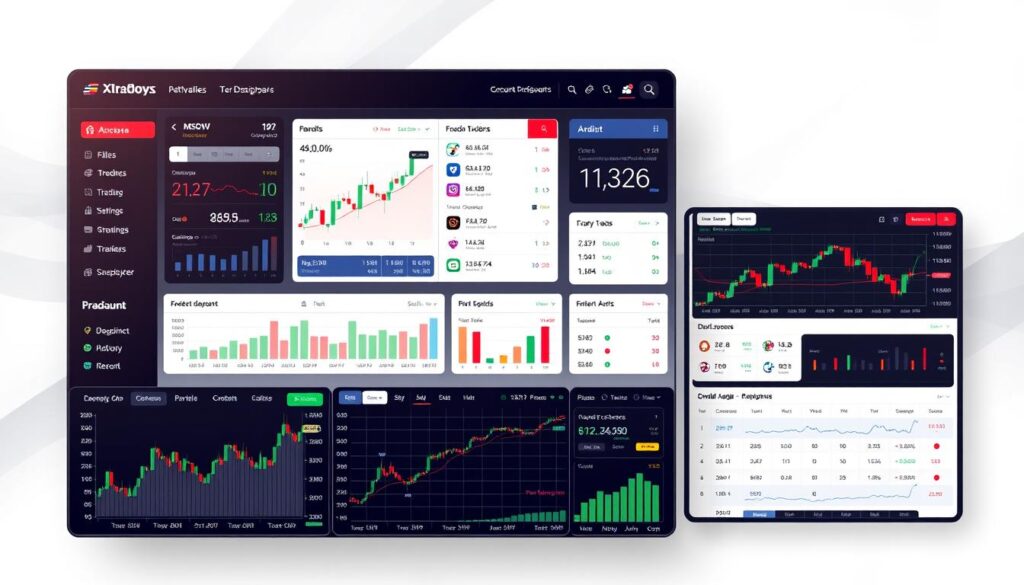
Modern investors need powerful tools to stay ahead in fast-moving markets. The best platforms combine real-time analytics, execution speed, and risk controls. Vietnamese users particularly value features like EMI calculators and SIP planners, offered by Bajaj Finserv.
Real-Time Market Data and Tools
Accurate data drives decisions. OANDA provides Forex heat maps, while Schwab’s StreetSmart Edge offers advanced charting. Demo accounts, like Schwab’s paperMoney®, let users practice strategies risk-free.
Order Execution Flexibility
Speed and precision matter. Iceberg orders hide large volumes, whereas Bajaj’s basket orders execute multiple trades at once. APIs, like OANDA’s developer portal, enable algorithmic order automation.
Margin and Leverage Options
Leverage amplifies gains but increases risks. Vietnam may cap retail Forex at 5:1, contrasting with OANDA’s 50:1. Always check SIPC protections—crypto assets often lack coverage.
Benefits of Using a Trading Account
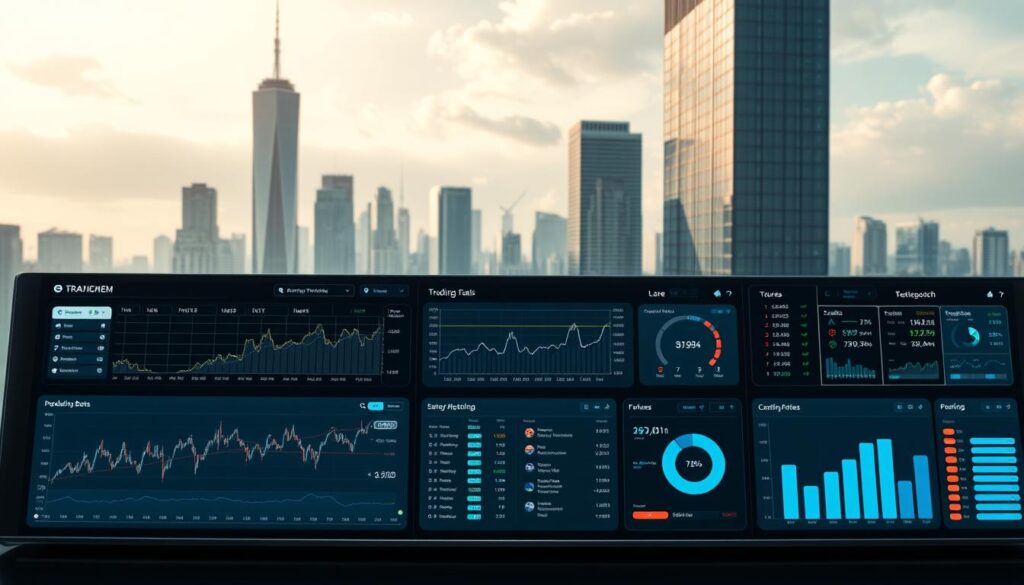
Smart investors maximize opportunities through specialized financial tools. Modern platforms offer benefits like global asset access, instant execution, and automated tracking. Vietnamese users particularly leverage these features to compete in fast-paced markets.
Access to Multiple Markets
Diversification becomes effortless with cross-border options. For example, Bajaj Finserv connects users to 100+ brands for EMI purchases, while platforms like Schwab enable fractional shares under $5. Vietnamese traders can even access SGX Nikkei futures without local limitations.
Convenience and Speed
Time-sensitive trades demand reliability. Schwab’s 0.08-second execution speed outperforms manual processes. OANDA extends liquidity with weekend cryptocurrency support, ensuring investors never miss opportunities.
Portfolio Management Capabilities
Automation simplifies wealth growth. The Bajaj app sends auto-drift alerts for rebalancing, while Schwab’s Performance Center consolidates reports. Cash management tools, like UPI instant transfers, add flexibility for active users.
A Vietnamese trader’s success with OANDA’s carry trade strategy highlights these benefits. By leveraging real-time data and low-latency execution, they turned market volatility into consistent profits.
How Trading Accounts Work
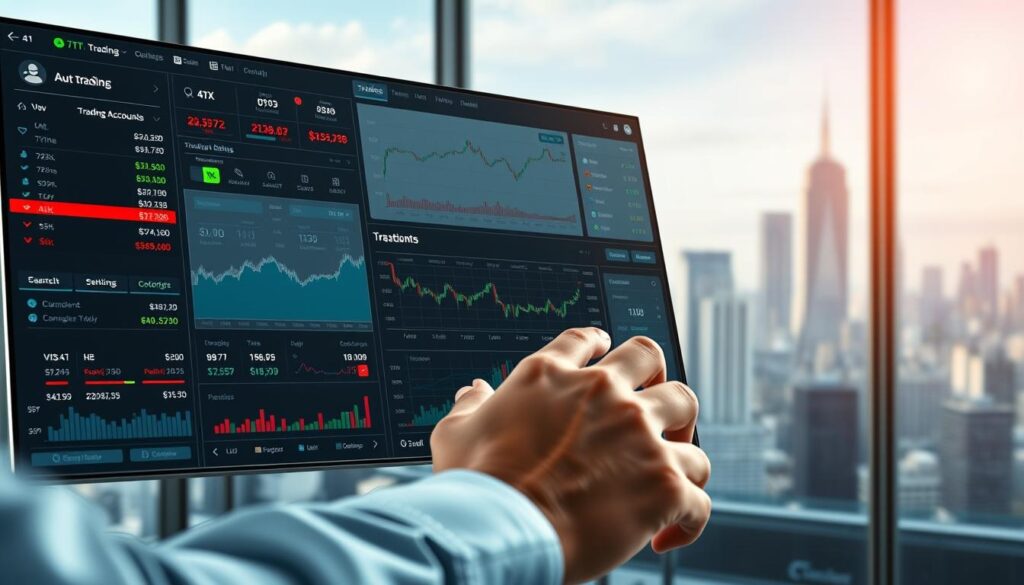
Behind every successful trade lies a well-managed financial interface. These platforms handle everything from onboarding to settlement, ensuring smooth market participation for investors worldwide.
Account Setup and Funding
Bajaj’s account setup requires four documents: PAN, photo ID, address proof, and income verification. Vietnam’s adoption of video KYC speeds up approvals, mirroring global trends.
Funding options vary by platform. *OANDA* supports USD wallets, while *Bajaj* enables INR netbanking. Most brokers process deposits within 1–2 business days.
Placing Trades and Monitoring
Placing trades triggers a lifecycle from order to execution. *Schwab*’s T+2 settlement means securities transfer two days post-trade. Real-time dashboards track performance, with alerts for margin calls.
Corporate actions, like stock splits, auto-adjust in portfolios. *OANDA*’s 15-minute execution reports resolve errors swiftly, ensuring transparency.
Settlement and Record-Keeping
Settlements finalize ownership and cash flows. Vietnamese investors follow FIFO tax reporting, while SEBI mandates 7-year archival. Automated tools sync records with local IRS requirements.
Margin accounts auto-liquidate if equity dips below thresholds. Platforms like *Bajaj* notify users before triggering sell-offs, balancing risk and control.
Choosing the Right Trading Account for Your Needs

Finding the perfect financial tool depends on individual strategies and market conditions. Vietnamese investors should prioritize platforms that align with their goals, whether for quick scalping or long-term holdings. Below are key factors to consider before selecting a service.
Assessing Your Trading Goals
Start by defining objectives. A day trader requires low-latency tools, while a swing investor benefits from Schwab’s research libraries. Vietnamese users targeting the VN30 index might prefer Bajaj’s futures support.
Ask:
- Do you need automated alerts or manual control?
- Is leverage necessary (e.g., OANDA’s 50:1 Forex)?
- How frequently will you execute orders?
Comparing Brokerage Fees and Features
Costs impact profitability. While Schwab charges $0 for equities, its mutual funds cost $4.95 per trade. OANDA imposes a $50 inactivity fee, whereas Bajaj bills ₹20 per F&O contract.
Prioritize platforms with:
- Transparent fee structures.
- Demo accounts (test Bajaj’s basket orders).
- Regulatory compliance (NFA ID checks for U.S. brokers).
Evaluating Risk Tolerance
High leverage can amplify gains but also losses. Tools like Schwab’s Investor Profile Quiz help gauge comfort levels. Vietnamese regulations may limit foreign ownership, affecting diversification needs.
Mitigate risk by:
- Setting stop-loss orders.
- Reviewing OANDA’s margin requirements.
- Starting with smaller positions.
A Ho Chi Minh City trader’s success with VN30 futures highlights the value of matching tools to goals and risk thresholds.
Essential Tips for Managing Your Trading Account

Proactive measures enhance performance and minimize unexpected losses. Vietnamese traders leverage real-time tools and regulatory insights to optimize their strategies. Below are expert-recommended practices to streamline operations and safeguard assets.
Regular Monitoring and Adjustments
Markets shift rapidly—staying alert is critical. Platforms like Schwab offer volatility-triggered price alerts, while Bajaj’s 2FA adds security layers. Vietnamese regulations mandate 0.1% VAT on securities, requiring precise record-keeping.
Key actions:
- Review margin levels weekly (e.g., OANDA’s 50% closeout rule).
- Backup trade journals to avoid data losses.
- Rebalance portfolios quarterly using Schwab’s drift alerts.
Utilizing Research and Analysis Tools
Data-driven decisions outperform guesswork. Schwab’s Ratings Screener filters stocks by fundamentals, while OANDA’s CFTC reports outline crypto risk. Demo accounts let traders test strategies without capital exposure.
Top resources:
- Heatmaps for Forex trends.
- DRIP options for automatic dividend reinvestment.
- API integrations for algorithmic adjustments.
Understanding Tax Implications
Vietnamese laws allow offsetting gains with harvested losses. Bajaj’s tax calculators simplify filings, while Schwab auto-generates IRS forms. Always verify local rules—some derivatives face different withholding rates.
Pro tips:
- Document all transactions for audits.
- Use FIFO methods for capital gains reporting.
- Consult support teams for complex filings.
Final Thoughts on Selecting a Trading Account
Smart financial decisions start with the right brokerage solution. Prioritize platforms offering diverse assets, transparent fees, and real-time tools like Bajaj’s EMI calculators.
Vietnamese investors must verify regulatory compliance, such as VSD registration. Diversify with multi-account strategies—combine forex for liquidity and equities for growth.
Emerging trends like ESG portfolios reshape the market. Demo accounts help test strategies, while OANDA’s leverage warnings prevent overexposure. Download a comparison checklist to simplify choices.
